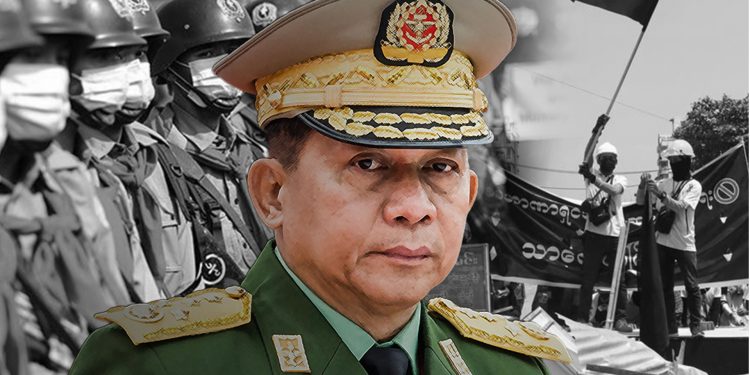MYANMAR – Senior General Minister Aung Hlaing, speaking at a military parade marking Armed Forces Day, also urged ethnic minorities not to support groups opposed to army rule and ruled out negotiations with them since the increase in their attack numbers just doesn’t stop;
The military seized power last year from the democratically elected government of Aung San Suu Kyi. Security forces used lethal force to suppress mass nationwide protests, resulting in the deaths of more than 1,700 civilians, according to a detailed tally compiled by the Assistance Association for Political Prisoners.
Forced to turn away from peaceful protests, many of those opposed to military rule took up arms, forming hundreds of militia groups called People’s Defense Forces — better known as PDFs. In some parts of the country, they’ve joined forces with well-organized, battle-hardened ethnic armed groups, which have been fighting for greater autonomy for decades.
Min Aung Hlaing, addressing thousands of military personnel during the parade in the capital Naypyitaw, he said the military — known as the Tatmadaw — “will annihilate them to (the) end,” according to an official translation of his speech.
His government has declared major resistance organizations — regardless of whether they are directly engaged in armed struggle — as terrorist groups. Membership or even contact with them carries harsh punishment under law.
Despite a huge advantage in equipment and numbers, Myanmar’s military has struggled to crush the new militia units. Outgunned and outmanned, the PDFs have relied on support from local communities and knowledge of the terrain to carry out often surprisingly effective attacks on convoys, patrols, guard posts, police stations and isolated bases in remote areas.

The military is currently conducting operations in Sagaing, in upper central Myanmar, and in Kayah State, in the country’s east, using airstrikes, artillery barrages and the burning of villages. The army recently seems to have expanded its offensive into Chin State in the west and Kayin State in the southeast as well.
Last year’s Armed Forces Day was the single bloodiest since the military’s Feb. 1, 2021, seizure of power. Security forces across the country opened fire on demonstrators, killing as many as 160 people.
Anti-military protests were held Sunday despite the risks in Yangon, the country’s biggest city, and elsewhere. To avoid arrest or injury, urban street protests usually involve flash mobs, which quickly disperse before security forces crack down.
The U.S., Britain and Canada on Saturday imposed the latest in a series of coordinated sanctions on senior military officials and business leaders who allegedly act as arms dealers for Myanmar’s army.
The fresh sanctions came the same week that the U.S announced it had determined the military’s actions in a crackdown on the Rohingya Muslim ethnic group in 2017 constituted genocide. A brutal counterinsurgency campaign compelled more than 700,000 Rohingya to flee from western Myanmar to Bangladesh, where virtually all remain. The genocide committed by the army against the Rohingya have been well documented by U.N. investigators, and the World Court is considering a charge of genocide against the Tatmadaw.




